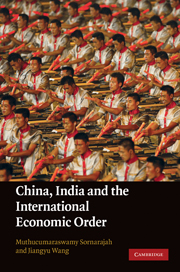Preface
Published online by Cambridge University Press: 03 May 2011
Summary
It has never been so timely to examine the impact of the rise of China and India on the international economic order in the wake of the ongoing global economic crisis. The rapid integration of China and India into the world economy is not only lifting the living standards of over two billion people, but also shifting the global balance of power toward the East. However, the implications of this rise on the international economic and legal system have not been fully explored and many questions remain unanswered. For example, what is China's or India's attitude toward the existing international economic norms including the trading system and its dispute resolution system? What is the role of China and India in regional economic integration which may however be highly politically oriented? Further, although China and India are both on the road to economic globalisation, they seem to have adopted different domestic approaches which might have profound impact on their international behaviors.
This volume, having its origins in a highly successful international symposium of the same title organised by the Faculty of Law of the National University of Singapore in June 2006, is an attempt to address these questions. It brought together a group of distinguished scholars on international law, world trade law and law and development to conduct a unique examination of the roles of China and India in the new world economy from the perspectives of international economic law and comparative law.
- Type
- Chapter
- Information
- China, India and the International Economic Order , pp. xv - xviPublisher: Cambridge University PressPrint publication year: 2010
- 9
- Cited by



